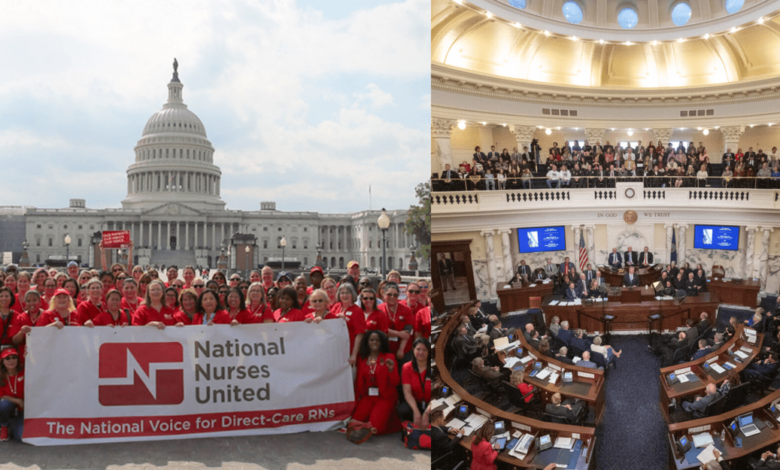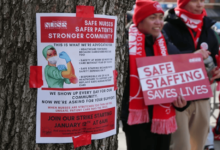Legislation That Matters To Nurses 2025 at The State and National Levels

This Preceptor Tax Incentive bill, represented by Rep. Neil Rafferty and signed into law by Governor Kay Ivey on June 6, 2023. This law provides income tax credits to healthcare professionals-including physicians, dentists, optometrists, nurse practitioners, certified nurse midwives, certified registered nurse anesthetists, and physician assistants-who serve as uncompensated preceptors for students during clinical rotations in rural and medically underserved Alabama counties.
The state’s loan repayment program provides up to $15,000 in loans to students and graduates of advanced practice nursing programs (CRNPs, CRNAs, CNMs) who commit to work in areas of critical need, now expanded to include provider shortage areas and Federally Qualified Health Centers, not just rural areas.
Legislation is being considered to standardize education and voluntary credentialing for Nursing Support Technicians, aiming to improve patient care and provide career advancement opportunities for healthcare support staff. This would not apply to Certified Nurse Aides, who are regulated separately.
Senate Bill 130
Alaska is shifting towards solving the nursing shortage with a bill by politician Mike Prax that allows the state to join the Nurse Licensure Compact. Hospitals and the Alaska nursing state board agree with the legislation. The Nurse Licensure Compact (NLC) will enable a nurse to have one license and practice in any NLC-approved state.
However, the nursing unions are opposing the bill. Joelle Hall, president of the state labor union federation and the Congress of Industrial Organizations, claims the bill will not solve the nursing shortage but replace Alaska’s nurses with an out-of-state workforce. As of May 2025, the bill remains pending.
House Bill 2691
The governor of Arizona, Doug Ducey, signed legislation that provides 15 million dollars for the Nurse Education Investment Pilot Program. It provides $15 million annually for the Nurse Education Investment Pilot Program, supporting nursing programs at community colleges and public universities to increase faculty and expand student capacity.
Provides $25 million annually (2023–2026) to expand preceptor training, clinical placements, and support for nursing students and new graduates. The goal is to address staffing concerns by increasing the number of qualified nurses and preceptors statewide.
House Bill 2310
Proposes that Arizona join the APRN Compact, allowing advanced practice registered nurses to hold one multistate licensure and practice in any compact state. This would increase mobility for APRNs and help address workforce needs.
Arkansas Act 959 (formerly HB1131)
Was approved in April 2025, allows APRNs to delegate certain nursing tasks-such as medication administration and phlebotomy-to trained medical assistants and unlicensed staff under their supervision. The Arkansas State Board of Nursing will set rules for delegation, training, and supervision. The law excludes anesthesia administration and prohibits further delegation by unlicensed staff.
California is the only state with legally mandated minimum nurse-to-patient ratios for acute-care, psychiatric, and specialty hospitals. These ratios are enforced at all times and cannot be averaged, ensuring that hospitals maintain safe staffing levels on every shift. This law is designed to protect patient safety and uphold the professional scope of practice for registered nurses.
California’s SB 1451, signed into law in September 2024, streamlines and clarifies the process for nurse practitioners to obtain independent practice authority as “103 NPs” (in defined healthcare settings) and “104 NPs” (in all settings) under AB 890. The law expands what counts as qualifying clinical experience, eases transition-to-practice requirements, and simplifies patient disclosure rules for NPs practicing independently. It also clarifies restrictions on the use of physician and surgeon titles, further supporting nurse practitioners seeking autonomous practice in California.
Senate Bill 525
Introduced by Senator Maria Elena Durazo, was signed into law in October 2023. The law phases in a $25 per hour minimum wage for most health care workers at covered facilities across the state, with the timeline for reaching $25 varying by facility type and size. The legislation aims to address staffing shortages and improve retention, and it is now in effect with phased implementation that began June 1, 2024.
Senate Bill 23-167
Effective July 1, 2024, any individual who obtains a certification from the American Midwifery Certification Board must pay a required fee and complete a criminal background check to obtain licensure and practice as a midwife within Colorado. Politician representatives are Sen. Faith Winter and Sen. Perry Will. Governor Jared Polis signed the bill into law on May 25, 2023.
Colorado House Bill 23-1077 was signed into law on May 25, 2023, prohibits healthcare professionals from performing intimate examinations on sedated or unconscious patients without specific informed consent, except in emergencies or when prior consent has been obtained. The law also requires health facilities to implement policies and staff training to ensure informed consent is properly obtained and documented. Violations can result in disciplinary action and civil liability, and the law took effect on January 1, 2024
Senate Bill 1067
Connecticut’s Public Act 23-204, effective October 1, 2023, requires hospitals to establish nurse staffing committees with at least 50% direct care registered nurses, develop and post staffing plans semi-annually, and report compliance to the Department of Public Health. The law gives nurses the right to object to assignments, limits mandatory overtime, and subjects hospitals to civil penalties if they fail to comply with staffing, committee, or reporting requirements. While it does not mandate specific nurse-to-patient ratios, it ensures robust nurse participation and transparency in hospital staffing decisions.
Signed into law on August 31, 2023, amends the Childhood Lead Poisoning Prevention Act to strengthen compliance with lead testing and reporting requirements. The law mandates that physicians complete biennial training on lead prevention, requires the Division of Public Health to develop electronic forms for recording and reporting lead screening at 12- and 24-month well visits, and obligates laboratories and healthcare professionals to report all blood lead analysis results to the state. Additionally, the Division of Public Health must share lead screening data with school nurses to ensure students are up to date on testing.
House Concurrent Resolution (HCR 1)
Passed in January 2025, formally recognizes the significant contributions of nurses as frontline healthcare workers and shows the importance of basic protections and rights for the nursing profession. The resolution calls on the General Assembly, state agencies, nursing associations, and healthcare facilities to work collaboratively to uphold and promote nurses’ rights throughout Delaware. This measure highlights the vital role nurses play in the state’s healthcare system and affirms support for their well-being and professional practice.
The law increases penalties for anyone knowingly assaulting or battering hospital personnel-including nurses, other healthcare practitioners, employees, agents, or volunteers-while they are performing their duties and was passed at the state level March 2024.. Assault is now a first-degree misdemeanor, battery a third-degree felony, aggravated assault a second-degree felony, and aggravated battery a first-degree felony. This measure is intended to deter violence and improve safety for healthcare workers.
Kemp signed HB 383 into law on May 2, 2023. The law establishes enhanced criminal penalties for anyone convicted of aggravated assault or battery against healthcare professionals while they are performing their duties on a hospital campus. It also authorizes hospitals to create their own police forces with POST-certified officers, similar to campus police at colleges, to improve safety for healthcare workers and patients. The law took effect in July 2023 and is a direct response to the rise in workplace violence against healthcare staff, aiming to deter such acts and give hospitals more tools to protect their workforce
An approved and active law in Georgia. It establishes a loan repayment program for nursing faculty who hold at least a master’s degree and remain employed as nurse faculty in Georgia. The program will repay up to $100,000 of a faculty member’s student loans over a five-year period in exchange for their continued service as nursing faculty, aiming to recruit and retain qualified educators to address the nursing faculty shortage in the state.
Senate Bill 119 appropriates funds to establish a Bachelor of Science in Nursing program at the University of Hawaii Maui College, aiming to address the state’s nursing workforce shortage and allow Maui students to complete their degrees locally. The bill allocates $250,000 for fiscal year 2025-2026 and $350,000 for fiscal year 2026-2027 to launch the program, hire faculty, and purchase equipment. SB119 was enrolled to the Governor on May 2, 2025, and is set to take effect July 1, 2025
Allows the state Board of Nursing to issue temporary permits to out-of-state licensed registered nurses and practical nurses, effective January 1, 2025.
Also focused on rural nursing loan repayment, creating a $2.5 million fund to incentivize nurses to work in rural health professional shortage areas or critical access hospitals. This bill has been introduced but not passed as of May 2025.
Illinois Senate Bill 2022, known as the Safe Patient Limits Act, was passed by the Illinois General Assembly on April 8, 2025. The law sets strict maximum patient assignments for registered nurses in hospitals and other healthcare settings-for example, no more than one patient per nurse in critical care units and four in most specialty units2. Hospitals are required to develop staffing plans that comply with these limits, cannot reduce other staff to meet the requirements, and must protect nurses who report unsafe assignments. Enforcement is overseen by the Illinois Department of Public Health, with penalties for violations, all aimed at improving patient safety and nurse working conditions.
Indiana Senate Bill 176, signed into law on April 10, 2025, allows high school students to enroll in state-accredited practical nursing (LPN) programs and begin earning credits before graduating. Students must still obtain a high school diploma or equivalent before completing the program and becoming licensed. The law also expands the Indiana Board of Nursing to include a nurse faculty member, aiming to strengthen the nursing workforce pipeline in the state.
This bipartisan bill would make it a federal crime to assault hospital personnel, establishing fines and up to a 10-year prison sentence for offenders, with increased penalties for aggravated circumstances. The act was introduced in May 2025 by Senators Cindy Hyde-Smith and Angus King, and is supported by major healthcare organizations and is pending.
Senate Bill 174
The bill focuses on the safety of healthcare workers, creating penalties for individuals committing battery toward healthcare professionals. Governor Laura Kelly signed the bill into law in April 2023. President of the Kansas Hospital Association, Chad Austin, states:
“At a time when health care is facing a staffing crisis, we are pleased legislation that provides protections for health care workers has been signed into law. There are now criminal penalties for assault and battery of a health care worker.”
The bill requires the secretary for aging and disability services to grant physical environment waivers for certain rural emergency hospitals to provide skilled nursing facility care. Passed both chambers in April 2025.
House Bill 200
Due to the healthcare shortage, Kentucky proposes a new bill to establish the Kentucky Healthcare Workforce Investment Fund. Per reports, 65% of the funds would go towards scholarships to students interested in healthcare fields. The remaining percentage would go towards education measures such as faculties and equipment. Kentucky Nursing Association member Jennifer Wiseman shares:
“With regards to nursing, this legislation will help decrease financial barriers that are currently preventing qualified individuals from entering the nursing workforce pipeline.”
The bill passed both parties and signed into law on March 22, 2023.
Passed and signed by the Governor on April 1, 2025. This bill amends healthcare credential definitions to include physician assistant, dietitian, and nutritionist credentials, and limits certain healthcare training scholarship awards to nursing aide programs. It also removes employment restrictions for nursing aide scholarship recipients
Senate Bill 29
Louisiana Bill 29 requires licensed healthcare facilities to use heat-producing equipment during surgical procedures. Using a surgical smoke plume evacuation system aids in removing harmful surgical smoke in all operating rooms. The Governor of Louisiana signed the bill into law on June 1, 2023, and it goes into effect in August.
Maine
The bill proposes raising the minimum wage for essential support workers from 125% to 140% of the state minimum wage, effective January 1, 2026. This would bring direct care worker pay to approximately $20.51 per hour, helping to make these roles more competitive and improve retention.
Maryland
House Bill 278
As of May 2025, Maryland law now allows clinical nurse specialists to prescribe medications and durable medical equipment under State Board of Nursing regulations. Governor Wes Moore signed House Bill 278 into law on May 3, 2023, and it took effect on October 1, 2023. This law designates clinical nurse specialists as “authorized prescribers” under the Maryland Pharmacy Act, expanding their scope of practice to help improve patient care across the state
House Bill 19 / Senate Bill 216
Expands the Maryland Loan Assistance Repayment Program for Nurses and Nursing Support Staff, prioritizes funding for nurses in shortage areas or specialties, updates education requirements for licensure, and extends tax credits for nurse preceptors. The bill was passed and enrolled in April 2025 and takes effect June 1 and October 1, 2025.
Senate Bill 1361/House Bill 2196
The new legislature claims it will require the Department of Public Health to limit the number of patients a nurse can care for. Limitations would depend on the hospital unit. The bill was heard in committee on September 20, 2023, and remains under consideration in the House as of May 2025. It has not been passed into law.
Senate Bill 1147/House Bill 1867
Both bills claim to ensure hospitals are not enforcing mandatory overtime and follow the 2012 law, which prohibits nurses from mandatory overtime. The 2012 law specifies that a nurse must comply with overtime in emergencies where the patient’s safety is at risk. The bill is still in the House and has not been passed as of May 2025. The original 2012 law banning mandatory overtime for nurses is in effect, but this bill aims to reinforce and expand those protections.
Senate Bill 1539/House Bill 2330
A new bill will require healthcare workers to complete a safety risk assessment. Based on the assessment results, hospital facilities will create and implement programs to improve workplace safety among healthcare workers and patients. The bill is currently pending in the House of Representatives.
Three major Senate bills-SB 334, SB 335, and SB 336-make up the Michigan Safe Patient Care Act, supported by the Michigan Nurses Association and introduced in May 2023. All three remain pending in the Senate as of May 2025.
Senate File 1384
The Nurse and Patient Safety Act (SF 1384/HF 1522) was passed by the Minnesota Legislature and signed into law on May 22, 2023. This law includes:
- Student Loan Forgiveness: Ongoing funding for three years to hospital nurses with at least three years of experience, with expanded eligibility and waivers for changing schedules.
- Workplace Violence Prevention: Requires all hospitals to develop and implement comprehensive workplace violence prevention plans with input from nurses and direct care staff.
- Hospital Closure Protections: Mandates hospitals give 182 days’ notice before closing or reducing services, with strict fines for noncompliance and a right of first refusal for local governments.
- State Audit of Nonprofit Hospitals: Orders a state audit of nonprofit hospitals’ community benefit spending and charity care.
- Surgical Smoke Evacuation: Requires all hospitals and surgical centers to use smoke evacuation systems during procedures likely to generate surgical smoke, effective January 1, 2025.
Senate Bill 2373
The legislation seeks to motivate graduated nursing students to stay and work in Mississippi. The program offers financial assistance for new nursing graduates who choose to work in the state. According to reports, qualified nurses can receive up to $6,000 annually for up to three years. The bill was signed into law on March 8, 2023. The Governor of Mississippi, Tate Reeves, shares:
“This legislation will strengthen the pipeline of medical professionals and improve the quality of care for all Mississippians. Innovation is the solution to our healthcare challenges and it is the solution to keeping talented Mississippians here.”
Senate Bill 157
The new legislation will lift restrictions on advanced practice registered nurses to serve the communities and provide better patient care in Missouri. According to reports, APRNs can only diagnose, prescribe medications, and evaluate a patient with a physician signing off. This law will go into effect August 2025.
In the new legislation, APRNs can prescribe schedule II controlled substances to hospice patients and meet with a physician once every two weeks to review patients’ medical records and care.
HB 409 was signed into law by Governor Greg Gianforte on March 25, 2025 and revises the state’s injunction laws by requiring Montana courts to follow only U.S. Supreme Court guidelines when evaluating applications for preliminary injunctions and temporary restraining orders, rather than using broader federal circuit court standards. The bill aims to reinforce the legislature’s authority and limit judicial overreach in blocking laws passed by the legislature.
This bill which aims to address the nursing staffing challenges in rural Nebraska by providing scholarships to students willing to work in rural hospitals-has passed and is now law. The bill, sponsored by Sen. Raymond Aguilar, adopts the Rural Nebraska Nursing Workforce Act and establishes a scholarship program for nursing students who commit to serving in rural areas after graduation. This initiative provides funding to Nebraska colleges and is designed to increase the number of nurses in underserved communities.
Senate Bill 375
This bill passed and signed into law on June 15, 2023. The bill makes a $10 million appropriation for each of the fiscal years 2023–2024 and 2024–2025 to the Nevada System of Higher Education (NSHE) for a grant program to expand undergraduate and graduate nursing programs at NSHE institutions. The grants are specifically for operating costs associated with expanding nursing programs and cannot be used for capital expenditures like new facility construction.
Senate Bill 215
The bill was signed by the Governor on July 28, 2023, and took effect the same day. SB 215 amends the requirements for entry-level school nurses, allowing those with an associate’s degree in nursing to be hired, but requiring them to enroll in a registered nurse to bachelor of science in nursing (BSN) program and obtain their BSN within six years of hire if hired after August 25, 2019. This change aims to address workforce shortages while maintaining a path toward higher educational standards for school nurses.
This bill was signed into law, effective January 1, 2025 and prohibits health carriers from setting payment or reimbursement policies based solely on a participating APRN’s license, promoting payment parity for advanced practice nurses.
Senate Bill 3547/Assembly 4614
These bills modify the Nursing Faculty Loan Redemption Program. Lawmakers created a program to manage the nursing faculty shortage within the state. The program is to motivate individuals to pursue higher nursing education.
The program claims to provide a five-year loan redemption in exchange for individuals to ensure full-time or part-time employment at a school nursing facility. Bill S3547 remains in the Senate, while A4614 passes the assembly house in May 2023. Sen. Nellie Pou, Sen. Joseph Vitale, and Assembly Member Louis D. Greenwald are politicians sponsoring this legislation.
Senate Bill 1949/Assembly 1659
These bills establish new requirements and initiatives to support the nursing workforce, including the creation and funding of nurse residency programs for registered nurses and licensed practical nurses in acute care, long-term care, home care, and other settings. The law appropriates $26.7 million and directs the New Jersey Collaborating Center for Nursing to administer these programs and provide technical, financial, and material support to participating facilities. It also transfers oversight of certified nurse aides from the Department of Health to the Board of Nursing, aiming to strengthen workforce development and retention statewide.
Assembly Bill 944 and Senate Bill 1983
These bills would remove certain restrictions on the practice of advanced practice nurses, allowing them to work more independently after gaining at least 24 months or 2,400 hours of licensed, active advanced nursing experience. Under this legislation, advanced practice nurses would no longer need a formal joint protocol with a collaborating physician to prescribe medications or provide care once they meet the experience threshold. The bill aims to improve access to healthcare, particularly in underserved areas, by enabling experienced advanced practice nurses to practice to the full extent of their education and training.
This bill was signed into law in April 2025, this bill waives initial licensure fees for new nursing graduates, introduces a reserve license for retired nurses, defines “advanced practice registered nurse” in state law, clarifies nurse roles in sedation, and allows for single-state or multi-state nursing licenses.
Section 167 of the New York Labor Law
The New York State Department of Labor strengthened enforcement of the mandatory overtime protection law for nurses, now requiring employers to report all instances of mandatory overtime-even when exceptions apply-to the Department of Labor. Employers must make a good faith effort to cover overtime voluntarily before mandating it and must post information for nurses on how to file complaints. Penalties for violations range from $1,000 to $3,000, and a designated enforcement officer investigates complaints. Nurses can file complaints if forced to work overtime outside of specific emergencies.
Assembly 3076-A/Senate Bill 447-C
These bills were signed into law by Governor Kathy Hochul on May 15, 2023 and allows nursing students in New York to complete up to one-third of their required clinical training through high-quality simulation experiences, overseen by the State Education Department. The legislation is designed to help address the nursing shortage by expanding access to hands-on clinical education and expediting the graduation of new nurses.
The New York State Nursing Shortage Correction Act is currently active in the Senate Labor Committee. This bill would create statewide pilot initiatives and provide funding to nursing schools, educational institutions, and healthcare providers to increase the number of nurses in New York. The funding could be used for recruitment and retention incentives, expanding faculty capacity, developing new or expanded nursing education programs-including clinical simulation labs-supporting internet-based and satellite coursework, retaining retiring nursing faculty as educators, and mentoring programs to introduce students to nursing careers.
House Bill 218/Senate Bill 175
The act removes restrictive regulations that advanced practice registered nurses can only perform with a doctor’s supervision in North Carolina. Supporters like the North Carolina Nurses Association (NCNA) argue that the act will enable APRNs to use their licenses fully. President of the NCNA, Meka Ingram, shares:
“APRNs have a phenomenal track record of providing quality care, and they deliver that care more affordably and more efficiently when given the opportunity through modernized regulation.”
Senate Bill 2114
North Dakota’s Senate Workforce Development Committee developed an agency bill to establish an Alternative to Discipline (ATD) program for nurses. The program would offer non-disciplinary approaches for nurses struggling with substance use or mental health issues. The North Dakota Board of Nursing reports the program could support nurses in their mental health conditions while remaining in the workforce. The governor signed the bill on March 23, 2023.
Senate Bill 3
Senator Kristina Roegner presented a bill that would include the state of Ohio in the Nurse Licensure Compact. The governor of Ohio signed the bill in July 2021. The new legislature became effective in January of this year.
Signed into law by Governor DeWine on January 8, 2025, this law requires Ohio hospitals to implement comprehensive workplace violence prevention plans, providing new safeguards and protections for nurses and healthcare professionals.
Introduced in February 2025, this bill also seeks to expand independent prescriptive authority for APRNs, allowing them to prescribe medications without a physician supervision agreement. It is currently pending in the Senate Health and Human Services Committee.
Senate Bill 523
Higher nursing education will become available to individuals in rural areas of the state and potentially improve the nursing shortage. According to reports, the bill will allow 17 community colleges to offer nursing BSN programs. It will enable accessibility and affordability to future nursing students. The governor signed the legislation on July 13, 2023.
House Bill 2697
New legislation has been passed to fix the poor nurse-to-patient ratios for healthcare systems. According to the Oregon Nurses Association, the bill will develop a numerical safe staffing ratio based on each unit of the hospital for nurses and CNAs.
In addition to improving staff ratios, the bill will force employers to allow staff members a rest break and create new staffing committees. The legislature passed both houses on June 22, 2024. Rulings for staffing ratios were made mandatory starting June 1, 2024.
House Bill 2789
Oregon HB 2789 prohibits the Oregon Health Authority from requiring, in specified circumstances, that a primary care provider (PCP) must order a covered care management service as a condition for reimbursement when the service is provided by a licensed registered nurse to a medical assistance recipient. The bill applies when the service is within the nurse’s scope of practice and the patient does not have a PCP. The bill also directs the Oregon Health Authority to develop a schedule of covered care management services for which a registered nurse may seek reimbursement and to establish billing and documentation protocols. Oregon Governor Tina Kotek signed House Bill 2789 into law on May 28, 2025. This landmark legislation allows registered nurses to bill Medicaid directly for care-management services, marking a substantial change in how nursing care is recognized and compensated in the state.
This new law sets minimum staffing ratios for doctors, nurses, and certified nursing assistants in correctional facilities, requiring facilities to meet specific staffing levels to ensure safe and adequate care. The law is being implemented in phases, giving facilities several years to reach full compliance with the new staffing standards. This phased approach allows correctional institutions time to adjust their hiring and operations to meet the mandated ratios.
House Bill 106
The Patient Safety Act addresses the safe staffing ratios in the state. The new legislation claims to enforce hospitals to provide safe nurse-to-patient ratios. The bill passed the House on June 28, 2023 by a vote of 109-84 and is now pending in the Senate.
House Bill 1249
Pennsylvania needs more teachers, nurses, and law enforcement professionals. The new legislature offers to provide a tax credit of $2,500 each year for a total of three years to individuals who:
- Are resident of Pennsylvania and secures employment in the state as a certified nurse, teacher, or police officer
- Come from another state and secures a job in the state as a certified nurse, teacher, or police officer
The bill passed the House of Representatives on June 20, 2023, and is now pending in the Senate House as of May 2025.
Rhode Island
Health Care Legislative Package
This bill was passed and signed into law by Governor Dan McKee on August 16, 2024. This package includes seven new laws aimed at improving health outcomes, expanding access to care, and protecting patients across the state. Notable measures within the package:
- Make it easier for nurses to begin working before their NCLEX results are finalized, streamlining entry into the workforce.
- Expand Rhode Island’s participation in interstate compacts for healthcare professionals, including social workers and counselors, increasing provider availability and access to care.
- Prohibit hospitals and providers from reporting medical debt to credit bureaus, protecting patients from financial harm.
- End “white bagging,” ensuring patients can choose their pharmacy.
- Strengthen workforce licensing processes and increase access to mental health support.
These reforms are now active law and reflect Rhode Island’s ongoing commitment to improving healthcare access, workforce capacity, and patient protections
Senate Bill 517
By amending bill 517, licensed APRNs will have full practice authority. Certified nurse midwives will also have full authority if they obtain an APRN license. The politician representative for this bill is Sen. Tom Davis. The legislature is currently pending and remains in the Senate House.
House Bill 1167
The bill was passed by the legislature and allows the Medicaid reimbursement rate for community-based providers-including nursing homes and facilities caring for Medicaid patients-to be adjusted annually to keep up with inflation and other changes. This measure is intended to help address financial challenges that have led to the closure of several nursing homes in recent years and to support care for the elderly and disabled community in South Dakota.
Senate Bill 2295
This bill signed into effect March 13, 2025.will allow certified medication aides to administer medications under the supervision of a licensed, registered, or practical nurse. Applicants would need to meet the following requirements:
- Work as a certified nurse aide for at least one year
- Receive recommendations from employers
- Complete a training program approved by the state board of nursing
Senate Bill 25
Governor Greg Abbott signed SB 25 into law on June 18, 2023, and it became effective immediately. This legislation is a major effort to address the nursing shortage in Texas by providing scholarships for nursing students, expanding loan repayment assistance for nurses and nursing faculty (including part-time faculty), and creating grant programs to support nursing education and clinical training. The Nurse Faculty Loan Repayment Program and the Nursing Innovation Grant Program are key components, aiming to boost the recruitment and retention of both nursing students and faculty
Senate Bill 1700
The HEAL Texans Act proposes to remove licensing requirements for nurse practitioners where they no longer have to work under the supervision of a physician. The bill claims APRNs can evaluate, diagnose, order tests, and manage treatment. As of May 2025, the bill remains pending in the Senate House.
Senate Bill 0036
Senate Bill 36 will adopt the Full Practice Authority (FPA) for nurse practitioners (NPs). Initially, in Utah, NPs held a mandatory contract with a physician. With the new legislature, the FPA allows NPs to evaluate, diagnose, order tests, and manage patient treatment. President of the American Association of Nurse Practitioners, April Kapu, shares:
“These changes will help Utah attract and retain nurse practitioners, and provide patients access to high-quality care. We thank Governor Cox and the legislature for prioritizing patients and taking action to improve health care in the Beehive State.” The governor signed the bill on March 14, 2023.
This law makes significant changes to medical malpractice cases involving healthcare providers. The law caps total damages in malpractice cases at $1 million, repeals the requirement for affidavits of merit, and updates the procedures for pre-litigation review panels, making their findings advisory rather than binding. It also enhances protections for providers, including nurses, by limiting personal liability for judgments and establishing new data collection and reporting requirements for malpractice claims.
Senate Bill 36
This bill passed May 30, 2023 and allows targets to improve protections for healthcare workers within the state from verbal and physical assaults. The bill allows arrests to occur without a warrant or a police officer having to witness the assault. In addition, depending on the gravity of the aggression, guilty individuals could face charges such as misdemeanors or felonies. The bill recently passed earlier this year on May 30, 2023.
House Bill 2211
The bill will allow graduate nurses from an accredited nursing program in foreign countries to practice within the state with certain requirements. The legislature will allow the state board of nursing to provide necessary language examinations and verify the graduate’s credentials from their nursing program. The bill became lawful on March 26, 2023.
Senate Bill 1339
This bill provides standards and policies in certified nursing facilities to meet appropriate staffing requirements. The bill was signed into law on March 24, 2023.
Senate Bill 5236 is now fully in effect and strengthens Washington’s hospital staffing laws. Hospitals must establish staffing committees with equal representation from direct care nurses and management, develop and submit annual staffing plans, and publicly post staffing schedules. Starting July 1, 2025, hospitals must comply with their staffing plans at least 80% of the time or face corrective action plans and significant penalties, including possible fines and licensure consequences. The law also expands meal and rest break protections to all frontline staff, closes loopholes in mandatory overtime laws, and gives the Departments of Health and Labor & Industries joint authority to enforce compliance. This law is the result of a compromise between healthcare unions and hospital associations to address chronic staffing shortages and improve working conditions for nurses and healthcare workers.
Senate Bills 5454
This bill was signed into law May 9, 2023; effective January 1, 20. This bill establishes a “presumptive eligibility” for workers’ compensation benefits for registered nurses suffering from post-traumatic stress disorder (PTSD) due to cumulative trauma, not just single traumatic events. Nurses who have provided direct patient care for at least 90 consecutive days in Washington are now presumed eligible for PTSD-related workers’ compensation, making it easier to access mental health care and benefits. The law recognizes the cumulative psychological stress nurses face and aligns their protections with those of police and firefighters, helping reduce stigma and encouraging nurses to seek help when needed.
Senate Bill 83
A new bill signed into law May 3, 2023 allows physicians, nurses, and EMS workers to carry firearms while on duty with law enforcement. According to reports, medical professionals would need approval from law enforcement and receive a certificate from the Law Enforcement Professional Standards Subcommittee.
This law, effective May 22, 2023, requires hospitals to have on-call, qualified healthcare providers-trained and certified by the Sexual Assault Forensic Examination Commission-available 24/7 to conduct sexual assault forensic exams and collect evidence kits. While the law aims to improve access to trained examiners, an amendment allows hospitals to comply by either staffing qualified personnel, transferring patients to facilities with such staff, or using telehealth, provided the patient consents. The law is intended to ensure timely, trauma-informed care for sexual assault victims, but advocates note that access challenges may persist, especially in rural areas, due to these flexible compliance options.
Senate Bill 145
A new bill appears before the Congress of Wisconsin to address the physician shortage by permitting full practice authority to nurse practitioners and clinical nurse specialists. The legislation would remove barriers such as physician supervision. The bill is currently awaiting the governor’s signature.
Nurse Faculty Shortage Budget Request
The Nurse Faculty Shortage budget request is a legislation approved by the Joint Finance Committee in Wisconsin (JFC). According to the Wisconsin Nurses Association, $5 million will go towards funding for nurses pursuing a master’s degree or doctorate in nursing education. Qualified nurses will commit to teaching within the state for three years. Members of JFC will need to vote on the entire legislation and then proceed to Congress.
Assembly Bill 204
Assembly Bill 204 received approval in Wisconsin state on June 7, 2023. The legislation no longer requires RNs and LPNs to complete a workforce survey and can complete it voluntarily with a fee of $400 to participate.
The Wisconsin Nurses Association opposes this bill because the workforce survey collects significant data on concerns within the nursing workforce. WNA is meeting with Senators to advocate not removing the workforce survey. This bill is pending as of May 2025.
Was signed into law in 2025, repeals the state’s Certificate of Need (CON) requirement for expanding healthcare facility beds. This means hospitals and nursing homes in Wyoming can now add beds and expand services based on patient demand without needing state approval through the CON process. The law is intended to improve access to care, reduce regulatory barriers, and allow facilities to respond more flexibly to community healthcare needs.
Nurse Staffing Standards for Hospital Patient Safety and Quality Care Act (Senate Bill 1113/H.R.2530)
Sponsors: Senator Sherrod Brown and Representative Jan Schakowsky
Status: Pending in Committee
Latest Action:
- S.1113 remains in the Senate Health, Education, Labor, and Pensions (HELP) Committee since its introduction on March 30, 2023.
- H.R.2530 is stalled in the House Energy and Commerce Committee.
- Mandates enforceable nurse-to-patient ratios (e.g., 1:1 in trauma units, 1:5 in rehabilitation units).
- Protects nurses from retaliation for refusing unsafe assignments.
- Requires hospitals to publicly post staffing plans and compliance data.
- Backed by the American Nurses Association (ANA) and National Nurses United (NNU), which argue ratios improve patient outcomes and nurse retention.
- Opposed by hospital associations citing cost burdens and operational inflexibility.
Workplace Violence Prevention for Health Care and Social Service Workers Act (S.1176/H.R.2663)
Sponsors: Sen. Tammy Baldwin (D-WI), Rep. Joe Courtney (D-CT)
Status: Reintroduced in 2025; Pending in Committee
Latest Action:
- Reintroduced in April 2025 (S.1176) with bipartisan support, reflecting heightened urgency after a 2024 GAO report highlighted rising violence against healthcare workers.
- House version (H.R.2663) was previously passed in 2023 but died in the Senate.
- Requires OSHA to enforce workplace violence prevention plans in healthcare/social service settings.
- Mandates risk assessments, staff training, and incident reporting.
- Modeled after California’s 2017 law, which reduced violence by 30% in early adopters.
- Endorsed by ANA, NNU, and the American Federation of Teachers. Critics argue compliance costs could strain rural facilities.
Protecting the Right to Organize (PRO) Act
Sponsors are Senator Bernie Sanders and Representative Bobby Scott
Status: Stalled in Senate
Latest Action:
-
Overrides state “right-to-work” laws, enabling unions to collect dues from all covered workers.
-
Bans mandatory anti-union meetings and strengthens penalties for employer violations.
-
Classifies many gig workers (e.g., home health aides) as employees eligible for unionization.
-
Championed by NNU as critical for nurse advocacy on staffing and safety. Opponents, including the U.S. Chamber of Commerce, claim it stifles employer flexibility.
National Nursing Workforce Center Act (S.1482)
Sponsors: Senators Lisa Blunt Rochester (D-DE), Thom Tillis (R-NC), Jeff Merkley (D-OR), Kevin Cramer (R-ND)
Status: Introduced in the Senate on April 10, 2025; read twice and referred to the Committee on Health, Education, Labor, and Pensions.
Latest Action: As of May 2025, S.1482 remains under consideration in committee and has not yet advanced to a full Senate vote.
-
Establishes a federal nursing-focused health workforce research and technical assistance center within the Health Resources and Services Administration (HRSA) to collaborate with state-based workforce centers.
-
Creates a pilot grant program to support and expand state nursing workforce centers, including those in states that do not currently have one.
-
Provides funding for public-private partnerships to stabilize, analyze, develop, and invest in the nursing workforce, with a focus on data collection, research, and workforce development at the state and local levels.
-
Requires reporting to assess the impact of these partnerships and guide potential nationwide expansion.
-
The bill is endorsed by major organizations such as the American Health Care Association/National Center for Assisted Living and LeadingAge, who highlight the urgent need for coordinated federal and state strategies to address the nursing workforce shortage and ensure high-quality care for patients and seniors. Advocates emphasize that supporting nursing workforce centers will help build a stronger pipeline of caregivers and improve patient care across the country.
Save Healthcare Workers Act (H.R.3178/S.1600)
Sponsors: Reps. Madeleine Dean (D-PA), Mariannette Miller-Meeks (R-IA); Sens. Cindy Hyde-Smith (R-MS), Angus King (I-ME)
Status: Introduced in both the House and Senate in May 2025; currently pending in committee in both chambers.
Latest Action: The bill was introduced on May 5, 2025, and has received strong endorsements from major healthcare organizations, including the American Hospital Association, the Emergency Nurses Association, and the American College of Emergency Physicians. It awaits further action in congressional committees.
-
Makes it a federal crime to knowingly assault or intimidate hospital employees while they are performing their duties, mirroring protections already in place for airline and airport workers.
-
Authorizes federal prosecution and sets penalties of up to 10 years in prison for assault, with increased penalties (up to 20 years) if a dangerous weapon is used, bodily injury occurs, or if the assault happens during a declared emergency.
-
Includes protections for individuals whose actions are a direct result of a physical, mental, or intellectual disability.
-
Applies to all hospital employees and contracted workers, with the goal of deterring violence and improving workplace safety for healthcare professionals.
Support:
The bill is strongly supported by the American Hospital Association, Emergency Nurses Association, American College of Emergency Physicians, the Hospital and Healthsystem Association of Pennsylvania, and numerous hospital systems and healthcare leaders nationwide. Supporters argue the legislation is urgently needed due to rising rates of violence against healthcare workers, which threaten staff safety, patient care quality, and workforce retention.







